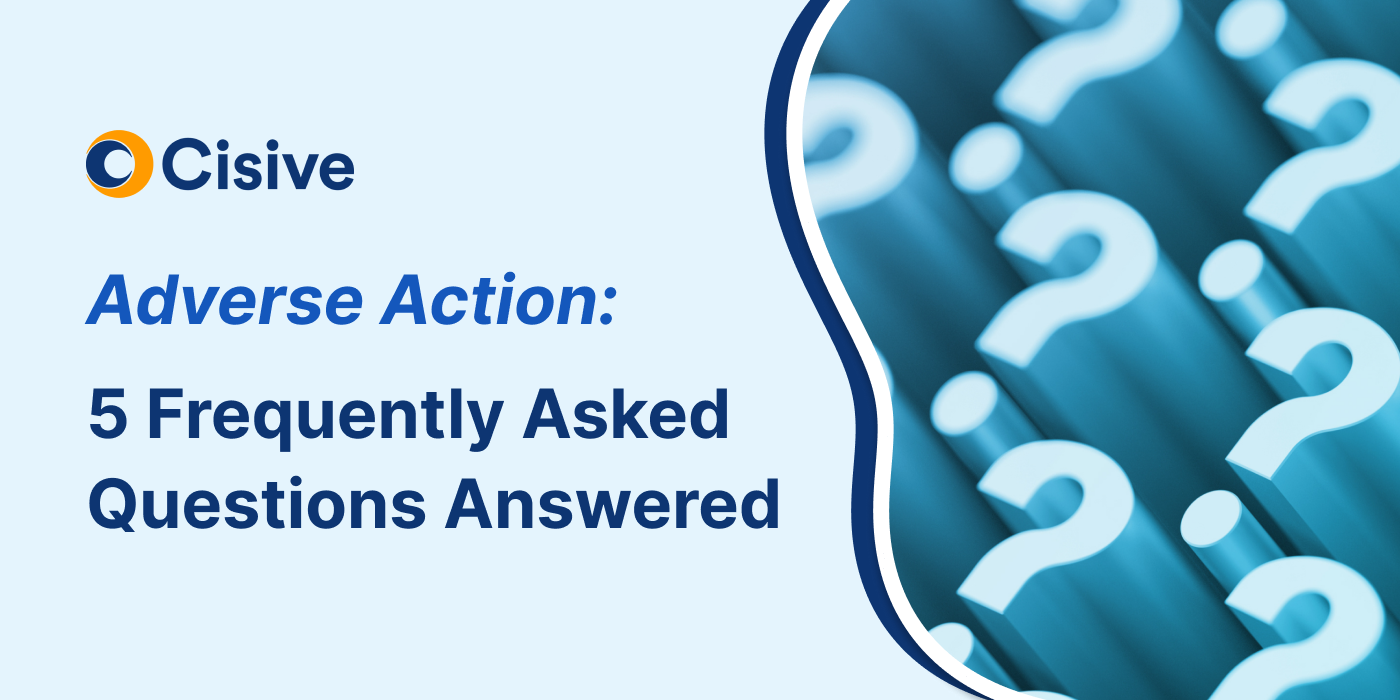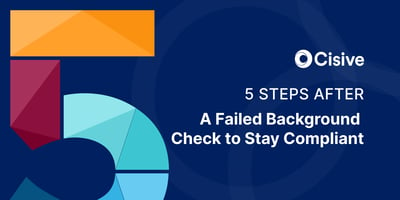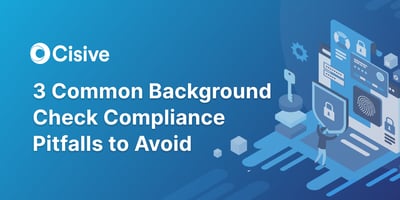

In this Cisive Product Highlight series, we review key tools to consider when screening your...

Understanding how the adverse action process works is crucial to staying on the right side of the law. The adverse process is tightly regulated. The Fair Credit Reporting Act (FCRA) applies to employers during the background check process which includes adverse action.
There are many valid reasons for not moving forward with applicants or dismissing employees. But there are also clear regulations on the correct ways to do so. If you’re performing a background check, you must understand these regulations.
In the context of employment, “adverse action” means any action an employer takes that negatively affects a current or prospective employee. These decisions, if based on a background check report, require notice and an opportunity for the individual to respond.
This can encompass several employment decisions, such as the following examples, that may be negative to the current or prospective employee:
Other examples of adverse actions an employer may use include:
There are many adverse actions that can be taken by employers under different circumstances. But to ensure fair treatment of employees and job applicants, there are several regulations that the federal and local governing bodies require you to follow.
It’s illegal to undertake an adverse action based on protected characteristics like race or gender. Employers also can’t take adverse action in retaliation for an employee engaging in legal human resources procedures. You may need to cite a reason that stems from a background check, such as a specific criminal record. You must also give the prospect notice of the action.
An employee or prospective employee who thinks that an action negatively affects them based on inaccurate information or illegal judgments has the right to share additional information.
The Fair Credit Reporting Act or FCRA is an act approved by Congress that lays out several requirements for an adverse action notice.
The FCRA covers the required notices for adverse actions taken due to the subject’s background check. Let’s investigate how this process should play out when screening a potential employee.
A potential employer can take an adverse action before an applicant is hired. Many employers perform background checks and credit checks as part of that process. An employer reserves the right to rescind an employment offer based on the results of a background check or credit check. However, the fact that you will investigate a consumer report and conduct other checks must be communicated to the prospect. The employer may be required to have a valid reason, however, which is normally a cited item from the background report.
It is standard practice to screen candidates utilizing a Consumer Reporting Agency in the hiring process for certain jobs. When job duties give employees access to sensitive documents, these checks are ubiquitous.
When an employer is reviewing a background report and decides to not hire the applicant, there should be consideration given to the type of infraction, how long ago the infraction was, and the job relatedness of the infraction. This includes cases when an employer:
In these cases, employers are entitled to take such actions by following the adverse action process.
For any adverse action process, first, the company is required to send a pre-adverse action letter. By sending a pre-adverse action letter, you are beginning the adverse action process.
Employers are obliged to follow regulations when presenting adverse action notices and during subsequent steps. These include several steps regulated by federal law, which we will go over in this section.
In addition, employers also must be aware of additional state, county, city, and other local laws and regulations. This is a crucial step, as these local regulations can vary.
After the company sends a pre-adverse action letter, the candidate can reply to the invitation for an individualized assessment.
If an employer decides to take any adverse action, they communicate it in writing.
Before making any final decision based on adverse information, a pre-adverse action notice must be provided. Employers must submit a copy of the background report. The background report used to form the basis of the preliminary decision must be submitted to the employee.
The pre-adverse action notice must also include a copy of the Federal Summary of Rights. So, at this point, the employee or prospective employee knows:
The written notice of adverse action is the adverse action letter. An adverse action letter is a formal, written explanation that the business has taken an adverse action regarding the employee’s application or employment status. Employers may inform employees with paper copies, or the letter can be delivered electronically. Whether with paper or digital copies, this satisfies the requirement.
When the employee receives the written notice, they must have a reasonable amount of time to review it. The written notification must explain:
During the pre-adverse action process, the employee should have enough time to review all of this. They are entitled to an opportunity to refute inaccurate information or incomplete information. Likewise, they may be able to refute the claim if outdated information is communicated in the adverse action decision.
Crucial to the adverse action notice is the part explaining what your employee or potential candidate can do. You must notify them of their rights to:
It is imperative to ensure that all these processes are followed. Disputes can escalate and there are many courses of action that a job applicant can take. Some law firms specialize in assisting job applicants and/or employees who were the subject of an adverse action.
Recommended Reading: 5 Commonly Asked Questions About Background Screening for HR and Recruiting Leaders
As we’ve alluded to, employers are required to give the job candidate time to read and reply to the notice. The FCRA says that a “reasonable amount of time” must be given. The Federal Trade Commission (FTC) has opined that a “reasonable amount of time” is five business days.
If the candidate accepts the adverse action notice and decides to move on without issue, then the matter is settled.
If the candidate reviews the background report and credit reporting agency documents, they may decide to dispute the results of the background check.
They can:
A background check is not necessarily a perfect document. Mistakes can be made and then corrected later. In extraordinary circumstances such as a case of identity theft, other issues may need to be addressed before the process is complete.
This is normally all dealt with in a timely manner. But the exceptions are a part of why the employer is required to give the candidate time to review the background check report.
The employer is obliged to carefully review and address the candidate’s changes. Again, this report can be delivered to them in electronic form or as a paper copy.
Here, the reasonable waiting period resumes. You should not rush the process, but whenever possible it is best to be thorough but respond in a timely manner.
Recommended reading: Minimize Legal Risk by Enforcing Compliance in the Adverse Action Process
Employers may legally still decide to continue with their adverse action. However, after the candidate responds with a dispute to that information, the business is again obligated to issue an adverse action notice.
These are the steps the employer must take if they wish to proceed with the intended adverse action.
When employers decide to take any adverse action, they must inform the individual of the decision again.
This notice may inform the individual in question of the specific reasons for the adverse action. This is when employers can share information from the reevaluation to justify the chosen course of action.
This notice must also contain the information on the individual’s rights, including the right to dispute inaccurate information.
After waiting a reasonable amount of time, the employer may take the adverse action. The recipient must have time to review the adverse action notice. Typically, 5 business days should suffice.
In any case, it is important to be aware of rules and regulations that apply in your particular jurisdiction. It is the employer’s responsibility to be aware of these laws to ensure compliance and protect the rights of employees and job applicants.
When you need to find the right talent, it’s necessary to make the most of background checks and other hiring procedures. Avoiding compliance risk is much simpler with the right help. Speak with an employment law expert to see where your adverse action process currently stands.
Yes, the FCRA requires employers to send a pre-adverse action notice. This applies to any adverse action notice against a current employee or a candidate.
Make sure you have a checklist and that you check off every item. A pre-adverse action letter may need to include:
It is also recommended that you take some steps on your side to ensure that you don’t suffer any consequences for non-compliance:
The Federal Trade Commission has opined to provide at least 5 business days. There may be state/county/local laws that require additional time.
Recommended Reading: Impact of Fair Chance Act Updates on Criminal Background Checks
Pre-adverse action letters are not necessarily final. After the process has begun, there is no mandated reason to continue with a denial of employment. Pre-adverse action letters are just the first step. The last step may be a final notice, but it can also be starting the hiring process.
It is always crucial to keep all of the documentation protected and then to dispose of it properly. These documents may include:
Physical documents should be shredded with a good shredder to render the documents unsalvageable. If one is not yet available to you, put it in a secured bin first while you wait.
Electronic data should be encrypted prior to disposal. Make it as difficult as possible for unauthorized users to access data on hard drives.
All companies that offer employment are responsible for respecting privacy. Employers should always have a document destruction policy that includes a destruction log and training material, so a current employee doesn’t make a mistake that could later prove costly.
No matter your background screening program, Cisive has the adverse action workflow in place to meet your needs. Speak with one of our experts today for a free assessment of your current process.
*This blog should not be construed as legal advice. Please seek legal counsel when building and implementing your adverse action process to ensure you’re following all relevant regulations, and that the information contained in your procedure is correct and compliant.

In this Cisive Product Highlight series, we review key tools to consider when screening your...

What happens when a candidate fails a background check after you’ve already extended the job offer?

Employers use background checks to protect their workforce, customers, and the business from risk....